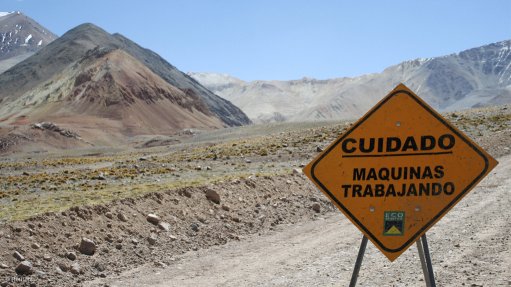
Barrick Gold's Pascua Lama on the Argentina side.
Photo by: Reuters
TORONTO (miningweekly.com) – Tax, the rise in union activism and a variance in provincial attitudes towards mining are central issues for those investing in Argentina’s mining sector, Holt Abogados partner and Argentinian mining law specialist Florencia Heredia told delegates at the Norton Rose Fulbright roundtable on Latin America last week.
“[It’s] something we’ve seen in the past five years, the increased pressure of unions. And it’s not only the mining unions but also the truckers and construction unions that tend to get more involved,” Heredia said, highlighting Santa Cruz province as an example.
“Santa Cruz is unique because it’s a province [with] a lot of exploration and many projects,” she said. “Originally, it was very friendly towards mining. Today is has a lot of union issues and the creation of special taxes. I would see this trend possibly continuing.”
“[Alternatively,] Salta and San Juan are two provinces that are more favourable [to mining]. So it’s not only the issues of regulation, laws and prices, but also the approach by government and the communities towards mining projects,” she added.
Dovetailing with this, Heredia stressed that companies and investors should make careful note of the provincial variance in tax structures and regulatory regimes.
“Argentina is a federal country with 23 provinces that have different regimes in terms of regulations at the environmental level. The way taxes are collected are [also] different at the federal and provincial level,” she said. “Over the past few years, there has been quite a tension between the provinces and the federal government in order to try and determine the general tax burden.”
Stemming from a push in the 1990s to attract foreign investment within its mining sector, Argentina established a tax stability term of 30 years and provincial royalties cap of 3%.
“In 2008 the stability [system] was challenged … Due to the imposition of an export tax regime, certain projects that had their tax burden stabilised or frozen, due to the benefits of the law, suffered sudden changes. This has been sort of overcome by the industry and accepted, although it is still a challenge,” she said.
“[Additionally,] we have experienced different alternatives to increase the share of [mining] profit for the government and this is part of a wider international trend,” she said. “This is due to many different views within government and the provinces and for social and political reasons.”
“I foresee change in the basics of the mining regulations … There might also be changes in terms of royalties that, in my view, is again part of an international trend,” she added.
“The main issue today is to try and address whether the benefits of the project go to the communities and how these benefits are best allocated,” she continued. “We’ll probably see a revision on this in Argentina and we hope that the mining sector will be able to have a serious discussion about it.”